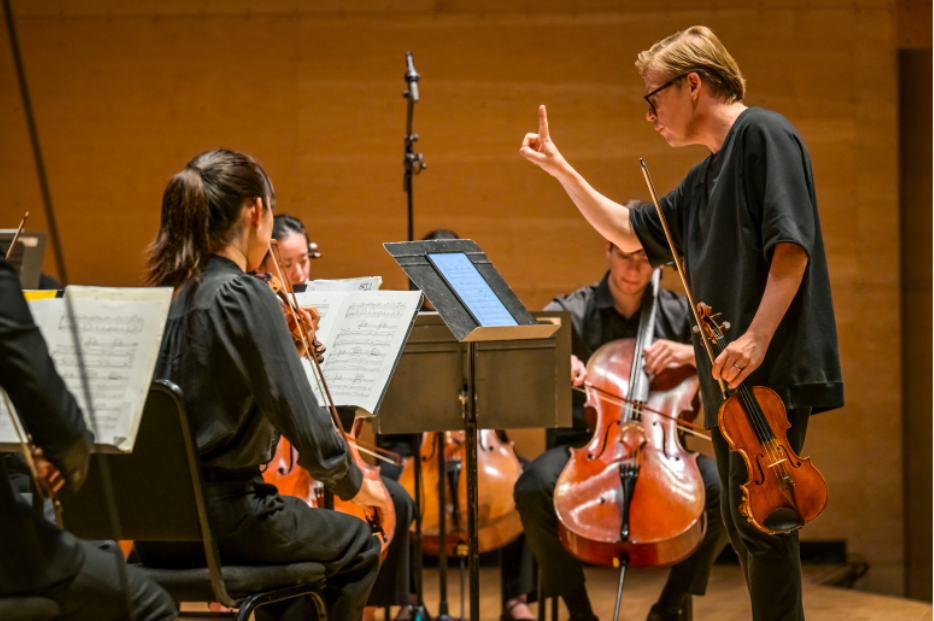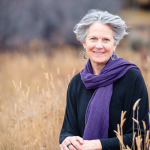Pekka Kuusisto-Nico Muhly recital outshines the orchestras

Diego Redel/Courtesy photo
Editor’s note: The original version of this story misspelled Conductor Xian Zhang’s name and has been updated to reflect the correct spelling.
Conductor Xian Zhang supercharged the Aspen Festival Orchestra in Sunday afternoon’s concert by applying her high energy to a meaty program: an opener that turned an invented hymn into an all-embracing piece of hope, one of Prokofiev’s less often-performed (but already explosive) symphonies, then finished with a platinum crowd-pleaser of a piano concerto.
The music director of the New Jersey Symphony was highly animated. She communicated with broad gestures and emphasis on rhythm. This paid dividends in Prokofiev’s Symphony No.6, an end-of-World War II opus that hammers away for two movements before lightening things up for a zippy finale. A tough go for the orchestra, the piece strides in guns blazing and hardly eases up for its 40 minutes.
In top gear, the decibel level was loud and louder. Was it exciting? Yes. Did it convey the horrors of war? Sure. But not every climax had to dial it up to 10. The finale was a relief, with lots of dancelike music to lift spirits even if the underlying unease kept making itself felt.
For the audience’s benefit, a bit more easing up here and there might have made the symphony vary its textures more without diminishing the effect. That thought could also apply to the Tchaikovsky Piano Concerto No.1 in B-flat minor, which seemed to set to “turbo” for the first movement and most of the finale.
For his part the young Canadian pianist Tony Siqi Yun blazed away at fast tempos in those outer movements. After the majestic opening measures, his flourishes might have also benefited from less pedal — at those tempos, details blurred. As the piece went on he used less pedal, which made things significantly better. Best were the quieter moments, especially the duet with flutist Mark Sparks in the slow movement and the tranquil contrasting segments of the finale.
The encore, Brahms’ Intermezzo Op. 118 No. 2, spotlighted Yun’s lyrical side, for the better.
Jessie Montgomery, currently the guest composer-in-residence at the festival, found the melody for “Hymn for Everyone” while on a neighborhood park walk early in the COVID-19 lockdown. The piece that opened the concert uses a big orchestra, and it relishes the sonorities of multiple instruments ingeniously in an uplifting series of subtle variations on the melody. The generously hopeful finish was well-earned.
Saturday evening’s recital in Harris Hall featured composer-pianist Nico Muhly and violin virtuoso (and sometime composer too) Pekka Kuusisto. They offered a feast of inventive contemporary music that’s eminently approachable. The program was bookended by J.S. Bach, opening with the Largo from the C major Sonata for Unacccompanied violin, and ending with a beautifully rendered encore of the organ prelude ‘O Mensch, bewein’ dein Sünde gross’, in an arrangement by Max Reger for string orchestra.
Without pause after the Largo, Muhly and Kuusisto strung together several pieces, each a gem, including Ellen Reid’s “Desiderium” for solo violin and Kuusisto’s solo violin arrangement of “Barcarole” by the Finnish jazz pianist Iro Haarla. Most arresting was Arvo Pärt’s “Fratres” in a version for piano and violin that adds increasingly complex variations for the string soloist against Kussisto’s unaccompanied repetitions. Muhly’s “Drones & Violin” explored resonances between the instruments’ sounds.
A 15-piece string orchestra, led with precision by the festival’s assistant conductor Paul-Boris Kertsman, changed the pace. “Birds of Paradise” by Andrea Tarrodi teemed with bird calls and soft harmonies, a lovely starter for the string orchestra alone.
After Muhly found all the colors in Philip Glass’s energetic early minimalist “Mad Rush” on solo piano came the meat of the program: “Shrink,” Muhly’s concerto for violin. Kuusisto’s expressive playing won the day in the three-movement work.
Earlier Saturday, in the afternoon chamber music program, French-Canadian violinist Blake Pouliot did justice to Lou Harrison’s Concerto for Violin and Percussion. Raucous but lively and seductively rhythmic, it was tinged with Javanese and Chinese percussion elements, bracingly offered by a percussion group led by Jonathan Haas. After two artfully zingy pieces rendered by a quartet of excellent violists, the afternoon closed with pianists Anton Nel and Cameron Stowe (a much-respected collaborative specialist) combining for an achingly beautiful Schubert Fantasy in F minor.
Friday’s Chamber Symphony concert started strong, with conductor Matthias Pintscher, newly minted music director of the Kansas City Symphony, leading a deliciously articulated performance of Ravel’s “Mother Goose” Suite. It swayed smoothly and showed all the colors a Ravel score should.
“Assonanza,” a violin concerto Pintscher wrote for Leila Josefowicz and the Cincinnati Symphony in 2022, came next on this program. Among A-list orchestras, the Boston Symphony, Chicago Symphony, Cleveland Orchestra, New York Philharmonic, Philadelphia Orchestra, Berlin Philharmonic and London Symphony have programmed Pintscher’s other compositions. This one did not go over well.
Pouliot did his best to articulate the wandering flares of dissonant melodic lines. The orchestra made a sort of quiet, restless grinding and scraping. It was irritating to listen to, and never seemed to land anywhere. That contrasts with the new music so far this season that has been impressive in its ability to communicate — including Montomery’s “Hymn for Everyone” and Kuusisto and Muhly’s entire recital.
Don’t blame Pouliot. His energetic and individualist performance of Ravel’s violin showpiece “Tzigane,” which followed, was so ebullient it often outpaced the orchestra. After intermission, Pintscher sent the dwindling audience out into a particularly lovely Aspen evening by leading a sober, carefully paced Brahms Symphony No.3.
Not to miss in the coming days: Gil Shaham and Adele Anthony’s annual recital is also a must-do. Tuesday’s program in Harris Hall includes a festival co-commission for two violins and orchestra, and a Vivaldi concerto for four violins. The Takács Quartet’s recital Thursday stays in their wheelhouse with Haydn, Janáček and Beethoven. Friday’s Chamber Symphony concert in the tent features pianist Lisa de la Salle the jazzy Ravel Piano Concerto in G major.
Harvey Steiman has been writing about the Aspen Music Festival for more than 30 years. His reviews appear in The Aspen Times Tuesdays and Saturdays




